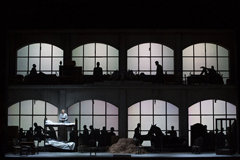| Opera Reviews | 8 May 2024 |
La Scala gives its first performance of Die Soldatenby Silvia Luraghi |
|
| Zimmermann: Die Soldaten Teatro alla Scala, Milan 17 January 2015 |
|
|
The current production shows the limits of a traditional stage: the original 2012 Salzburg staging was presented at the Felsenreitschule, and virtually created for the large open space offered by that unconventional theater. In addition, in Salzburg the orchestra could be placed on different levels, thus achieving the "surround sound" effect intended by the composer. At La Scala members of the orchestra who were not in the pit had to be placed in various locations in the boxes. The sets, on a much smaller scale, reproduced the arcades of the Felsenreitschule (even the stone banner with the name Felsenreitschule was reproduced), and three horses walked in the background as in the original staging. Based on a late 18th century play by Jakob Lenz, the libretto is set in pre-revolutionary France. Marie is the fiancée of Stolzius. She is seduced by a French officer, Desportes. Wesener, Marie’s father, encourages her affair, as he hopes to improve social conditions. Stolzius learns about the girl’s unfaithfulness and writes to her, only to the effect that she feels pushed toward Desportes. The latter plays with Marie for some time, but later gets bored, and passes her over to his comrades. After a number of other affairs, Stolzius kills Desportes and commits suicide, while Marie ends up becoming a street prostitute. When her father meets her begging for money he doesn’t recognize his daughter. The score features a mixture of styles intertwined with one another, including jazz and electronics. The vocal score is complex, and demanding on the voices, especially the women’s. At La Scala, Marie was played by soprano Laura Aikin, who displayed perfect control of her top range, also mastering the equally demanding theatrical side of her performance. Gabriela Beňačková was luxury casting for the Countess de la Roche, while Renée Morloc as Stolzius’ mother and Cornelia Kallisch as Wesener’s mother were equally compelling, as was mezzo-soprano Okka von der Damerau as Charlotte. Baritone Thomas Bauer was an initially thoughtful and later desperate Stolzius, with a very agile voice that climbed easily to the top register. Tenor Daniel Brenna depicted Desportes appropriately as a mean villain, and Alfred Muff was a committed Wesener. Conductor Ingo Metzmacher also conducted the original Salzburg production, and gave an engaging reading of the complex score. The orchestra played with great commitment, and the audience responded with enthusiasm.
|
|
| Text ©
Silvia Luraghi Photo © Brescia/Amisano © Teatro alla Scala |

 Bernd Alois Zimmermann's monumental opera Die Soldaten co-produced with the Salzburg Festival premiered at La Scala on January 17. This was the company premiere of the work, and it is only the second time the opera has been shown in Italy after a 1977 Florence production. In fact, the performance history of this impressive piece is much less rich than it deserves, on account of the challenges created by its staging.
Bernd Alois Zimmermann's monumental opera Die Soldaten co-produced with the Salzburg Festival premiered at La Scala on January 17. This was the company premiere of the work, and it is only the second time the opera has been shown in Italy after a 1977 Florence production. In fact, the performance history of this impressive piece is much less rich than it deserves, on account of the challenges created by its staging. 





